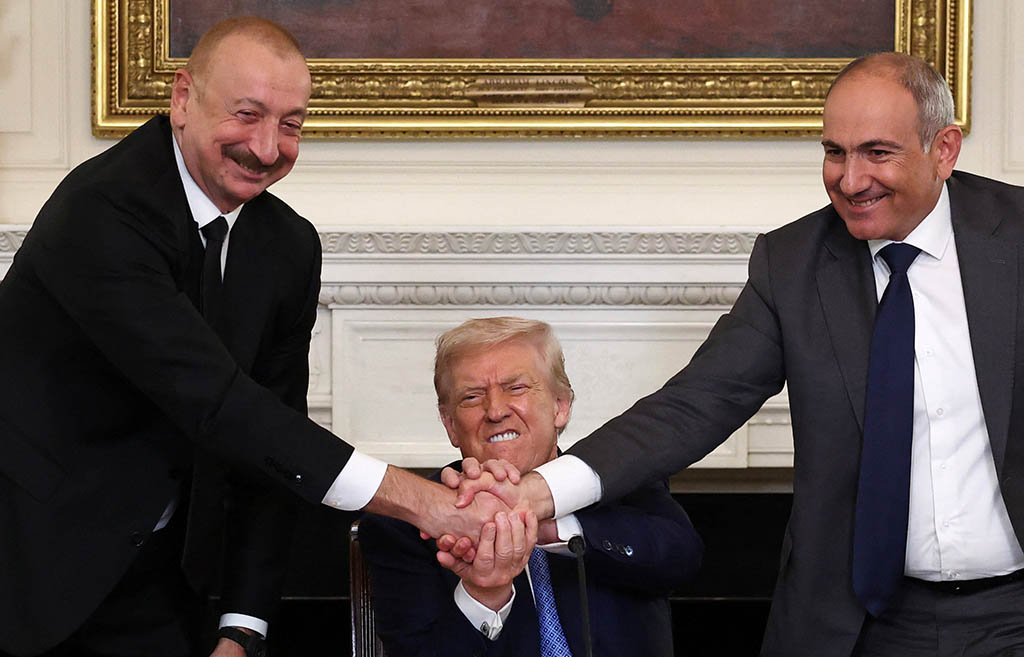Concrete signs of a thaw in Turkish-Armenian and Turkish-Kurdish relations. So what about Cyprus?
On August 8, 2025, in the gilded halls of the White House, a handshake between Armenian Prime Minister Nikol Pashinyan and Azerbaijani President Ilham Aliyev marked what many thought impossible – a declaration of peace between two nations divided by three decades of bloodshed.
The signing ceremony, staged with the characteristic flourish of Donald Trump, marked a genuine breakthrough. For the first time since the late Soviet era, Armenia, largely Christian, and Azerbaijan, largely Muslim, pledged to recognise each other’s sovereignty, establish diplomatic ties, and turn the trenches of Nagorno-Karabakh into pathways for trade and cooperation.
“They fought and now they’re friends,” Trump declared, presenting himself as the broker of reconciliation. Yet the real courage lay with the two leaders across the table. For Aliyev, the task was to shift from military success to political settlement, granting diplomatic recognition to a neighbour his army had so recently fought. For Pashinyan, the price was steeper, as he faced protests and accusations of betrayal from nationalists unwilling to compromise. By choosing this path, both leaders showed that decades of grievance could be set aside in pursuit of a different future.
Alongside this international breakthrough, a quieter process has begun inside Turkey. After four decades of conflict that claimed more than 40,000 lives, the Kurdish PKK group, designated as a terrorist organisation by Turkey, US, EU, UK, Nato, Canada, Australia, New Zealand, Japan and Iraq, announced its intention to disband and end its armed insurgency.
On July 11, 2025, about 30 PKK militants gathered at the entrance of Jasana Cave near Sulaymaniyah in northern Iraq for a highly symbolic act, placing their weapons into a large cauldron, later set alight in the presence of Turkish, Iraqi and regional Kurdish officials, as well as senior figures from Turkey’s pro-Kurdish DEM Party.
In response, the Turkish parliament has formed a 51 member “National Accord, Fellowship and Democracy Committee” to explore reforms. This is far from a “done deal”. Political pressures persist, and mistrust runs deep. Yet even tentative dialogue marks a recognition that decades of confrontation have brought only loss, and that compromise offers a more hopeful and rewarding path forward.
Taken together, these developments suggest something larger than isolated cessation of hostilities. In the Caucasus and within Turkey itself, old conflicts once thought permanent are being re-imagined through realism and goodwill. For Ankara, the lesson is clear. Reconciliation with its Kurdish political actors enhances domestic stability, while reconciliation between Armenia and Azerbaijan creates space for a thaw in Turkey-Armenia relations.
The latter has already begun. In June 2025, Pashinyan became the first Armenian leader in over three decades to visit Istanbul, signalling Armenia’s readiness to normalise relations. Turkish president Recep Tayyip Erdogan responded positively with support for regional reconciliation. This clearly signals a new start, in the right direction.
Through these acts, Turkey has shown that it is keen on taking steps to develop harmonious relationships with its neighbours and internal communities. What remains outstanding is the region’s greatest unresolved test of courage – Cyprus.
We will recall that Turkey was in favour of the biggest and most serious attempt at resolving the Cyprus issue, once and for all, through the 2004 UN Annan Plan, approved by the EU, Greece, Turkey, UK and US. However, as the former Greek Cypriot foreign minister Nicos Rolandis and many others have observed, it has often been the Greek Cypriot leadership that rejected compromises, choosing nationalist applause at home over practicable solutions. And this is precisely what happened with the plan – a no vote from the Greek Cypriot side. Many others, including Greek Cypriot observers, also have a similar view of what happened at the 2017 Crans-Montana negotiations.
Consequently, the outcome has been a half-century of limbo, with property claims unresolved and security concerns ever present. The time has come to evaluate solutions by their realistic ability to uphold rights and improve lives, rather than by unrealistic visions rooted in nationalist ideals.
If we accept this premise, how do we define and match realistic solutions to realistic modes of governance? For example, how could one advocate a unitary solution for Turkey and the Kurds, but a two-state partnership for Cyprus?
In Turkey, Kurdish and Turkish communities are fully integrated across the country. Istanbul alone is home to an estimated two to four million Kurds, making it the largest Kurdish community in the world, followed by Ankara and Izmir. Carving out a separate Kurdish state would mean uprooting millions of Turks and Kurds and destabilising the republic – an outcome that is both unrealistic and unacceptable from a human rights point of view. The realistic path is to strengthen existing rights within the unitary state, for example by fully implementing Kurdish language education in state schools. This would mirror the Spanish education model, where community languages are taught in state schools for Catalans and Basques while preserving national unity.
In Cyprus, the two communities lived together under a singular constitution and geography for merely three years, from 1960 when the republic was established. Between 1964 and 1974, Turkish Cypriots were confined to enclaves, and each community ran its own affairs. Since 1974, the two sides have consolidated their self-governance in two distinct geographic areas, north and south, covering all spheres of public life, from defence and foreign affairs to education, health, and policing. That means the two communities have operated independently for 61 years.
Here, the danger lies not in separation but in repeating a historic failure – pushing through another forced marriage between the two communities, and in doing so, ushering in conflict. As I have detailed previously, a rights-centred two-state partnership would allow both Greek and Turkish Cypriots to enjoy security, freedom of movement, property rights and a stake in a peaceful future, without forcing either side to live within the other’s constitutional story.
Turkey has taken important steps to mend fences at home with its Kurdish community and abroad with Armenia. Aliyev and Pashinyan have shown courage by striking a pragmatic deal that underwrites peace and promises an economically and socially beneficial future, based on reality. What remains to be seen is whether the same vision and leadership can be demonstrated by all parties in relation to Cyprus. I am not holding my breath, but hope springs eternal.






Click here to change your cookie preferences